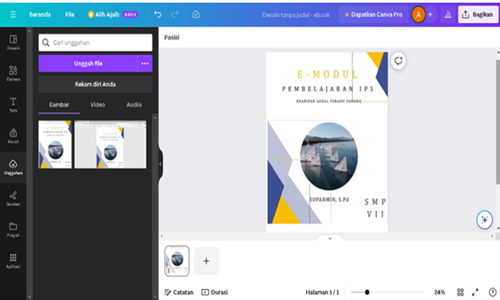
Development of a Social Sciences E-Module Based on Local Wisdom with a Problem Solving Approach to Improve Students' Critical Thinking Ability
Abstract
Keywords
Full Text:
PDFReferences
Afinda, B. N., Anwar, S., & Sumarna, O. (2023). Analysis of The Need for Applied Science Teaching Materials in Chemical Materials in Vocational School, Department of Culinary, Tangerang District. Journal of Education and Learning Research, 30-36.
Arikunto, S. (2006). Dasar-dasar Evaluasi Pendidikan. Jakarta: PT Bumi Aksara.
Asmuni. (2020). Problematika Pembelajaran Daring di Masa Pandemi Covid-19 dan Solusi Pemecahannya. Jurnal Paedagogy, 7(4), 281.
Bella, S., Azhar, A., & Nur, I. (2023). Development of Think-Pair-Share (Tps) Model Based Learning Tools for Global Warming Materials. Journal of Education and Learning Research, 20-29.
Borg, W. R., & Gall, M. D. (1983). Educational Research An Introduction (4th ed.). New York: Longman Inc.
Cevik, M., & Senturk, C. (2019). Multidimensional 21th century skills scale: Validity and reliability study. Cypriot Journal of Educational Sciences, 14(1), 11–28.
Christiyoda, S., Widoretno, S., & Karyanto, P. (2016). Pengembangan Modul Berbasis Kemampuan Pemecahan Masalah Pada Materi Sistem Ekskresi untuk Meningkatkan Berpikir Kritis. JURNAL INKUIRI, 5(1), 74–84.
Hake, R. R. (1999). Analyzing Change/Gain Scores. Dept. of Physics, Indiana University.
Hanum, H., Niah, S., & Pahmi, P. (2023). The Development of Podcast-Based-Audio Learning in Material Introducing Ourselves at 10th Grade SMA Muhammadiyah 1 Pekanbaru. Journal of Education and Learning Research, 37-46.
Hartati, F. D., Islami, N., & Rahmad, M. (2023). Needs Analysis of Learning Video Development Using Edpuzzle Based Problem Based Learning to Improve Critical Thinking Skills of High School Students. Journal of Educational Sciences, 7(1), 27–34.
Herdianto, E. N., Mardiyana, & Indriati, D. (2021). E-book Based on Mobile Learning Used Problem Based Learning (PBL) Model to Improve Problem-Solving Ability in Statistical Material. Journal of Physics: Conference Series, 1808(1), 012066.
Husein, S., Herayanti, L., & Gunawan, G. (2017). Pengaruh Penggunaan Multimedia Interaktif Terhadap Penguasaan Konsep dan Keterampilan Berpikir Kritis Siswa pada Materi Suhu dan Kalor. Jurnal Pendidikan Fisika Dan Teknologi, 1(3), 221.
Imran, A. F., Ngampo, M. Y. A., & Ardiansyah. (2022). Implementation of the Problem-Based Learning Model and Its Effect on Accounting Learning Outcomes During the COVID-19 Pandemic. Journal of Educational Sciences, 6(2), 275–285.
Imran, A. F., Priantinah, D., & Solikhatun, I. (2022). Development of Accounting E-Module to Improve Students’ Critical Thinking Ability. Journal of Educational Science and Technology (EST), 8(1), 1.
Jihad, A., & Haris, A. (2012). Evaluasi Pembelajaran. Yogyakarta: Multi Pressindo.
Kahar, M. I., Cika, H., Nur Afni, & Nur Eka Wahyuningsih. (2021). Pendidikan Era Revolusi Industri 4.0 Menuju Era Society 5.0 Di Masa Pandemi COVID 19. Moderasi: Jurnal Studi Ilmu Pengetahuan Sosial, 2(1), 58–78.
Kemendikbud. (2017). Panduan Praktis Penyusunan E-Modul (pp. 1–57).
Khanina, A., Zimovets, A., & Maksimenko, T. (2021). The role of media and information literacy during COVID-19 pandemic and post-pandemic period. International Journal of Media and Information Literacy, 6(1), 111–118.
Nengsih, L. W., Susiswo, & Sa’dijah, C. (2019). Kemampuan Pemecahan Masalah Matematika Siswa Sekolah Dasar dengan Gaya Kognitif Field Dependent. Jurnal Pendidikan: Teori, Penelitian, Dan Pengembangan, 4(2), 143–148.
Nurchaili. (2010). Pengaruh Media Pembelajaran Berbasis Teknologi Informasi Dalam Proses Pembelajaran Kimia terhadap Peningkatan Hasil Belajar Siswa. Jurnal Pendidikan Dan Kebudayaan, 16(6), 648.
Purwaningsih, D., & Pujianto. (2009). Blended Cooperative E-learning sebagai sarana Pendidikan Penunjang Learning Community. Seminar Nasional UNY.
Riegel, F., Martini, J. G., Bresolin, P., Mohallem, A. G. C., & Nes, A. A. G. (2021). Desenvolvendo o pensamento crítico no ensino de Enfermagem: um desafio em tempos de pandemia de Covid-19. Escola Anna Nery, 25(spe), 1–5.
Sa’diyah, A., Wilujeng, I., & Nadhiroh, N. (2021). The Effect of Using Smartphone Based Learning Media to Improve Students’ Critical Thinking Skills During Covid-19 Pandemic. Proceedings of the 6th International Seminar on Science Education (ISSE 2020), 541(Isse 2020), 374–379.
Sinarwati, N. K. (2015). Pengembangan E-Module Akuntansi Keuangan. 14–19.
van Peppen, L. M., Verkoeijen, P. P. J. L., Heijltjes, A. E. G., Janssen, E. M., & van Gog, T. (2021). Enhancing students’ critical thinking skills: is comparing correct and erroneous examples beneficial? Instructional Science, 0123456789.
Wulandari, S. (2020). Penerapan Pembelajaran IPS Tematik Terpadu Melalui Model Problem Based Learning( PBL) dan Media Modul untuk Meningkatkan Keaktifan dan Kemampuan Berpikir Kritis Siswa Kelas VIII B SMP Negeri 16 Surakarta Tahun 2019/2020 [Universitas Negeri Surakarta]. https://digilib.uns.ac.id/dokumen/detail/82374/
Yatmi, H. A., Wahyudi, W., & Ayub, S. (2019). Pengaruh Model Pembelajaran Generatif Terhadap Kemampuan Berpikir Kritis Fisika Ditinjau Dari Pengetahuan Awal Peserta Didik. Jurnal Pendidikan Fisika Dan Teknologi, 5(2), 287.
DOI: http://dx.doi.org/10.31258/jes.8.1.p.22-35
Refbacks
- There are currently no refbacks.
Copyright (c) 2024 Suparmin Suparmin, Warsono Warsono, Nuansa Bayu Segara, Hikmayani Subur, Ahmad Fadhil Imran

This work is licensed under a Creative Commons Attribution 4.0 International License.
Publisher: FKIP Universitas Riau












